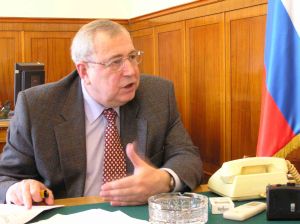
New Managing Director for Bellona Norway
The Board of the Bellona Foundation has appointed former Minister of Climate and the Environment Sveinung Rotevatn as Managing Director of Bellona No...
News

Publish date: April 18, 2005
Written by: Charles Digges
News
News Analysis
"This is, for now, merely my own political initiative, said Rumyantsev in a statement he released to the Russian media on Sunday.
Our overseas partners can save huge amounts if they use Russia’s available infrastructure instead of setting up their own."
Under Rumyantsevs current initiative, interested countries would remove equipment sensitive to their national security from vessels to be dismantled in Russia. They would also remove the vessels nuclear fuel, and send the hull on to Russia for complete dismantlement.
Import initiatives failureAs a consequence, import of spent nuclear fuel to Russia has so far been limited to former Soviet bloc nations such as Bulgaria and Hungary, falling far below Adamovs forecasted boom crop.
He and his successor have nonetheless lobbied the US government hard for rights to US produced spent fuel. But Washington has been reluctant to ease these restrictions because of Russias nuclear co-operation with Iran, where Moscow is building a 1000 megawatt light water reactor in the port town of Bushehr.
Matters have become even more complicated as Iranian dissident groups and the International Atomic Energy Agency have revealed ostensible traces of a nuclear weapons effort directed by Tehran.
Washington has thus taken a stick and carrot approach to Russias co-operation with Iran, offering Moscow limited supplies of US controlled spent fuel in exchange for Russia breaking nuclear relations with Iran. But Iran, the Kremlin has seen, pays cash up front, and has at least five further reactor contracts to offer Russia—which pales in comparison to the United States limited spent fuel offers. Russia has thus far turned Washington down and insisted on Iran’s behalf that the Islamic Republic has no intentions of developing a nuclear weapons programme, an assertion that looks more suspect as evidence mounts against Tehran.
Russian nuclear industry looking abroad for cash
Russia currently has several money-spinning operations, aside from the Iranian project, running abroad to keep it afloat. Among them are the HEU-LEU agreement with the United Stated under which weapons suitable highly enriched uranium (HEU) is down-blended to low enriched uranium (LEU) and sold to the United States for use in commercial reactors there. This programme has netted Russias nuclear industry some $7.5 billion since its inception in 1995.
Ironically, the HEU-LEU programme is also one of the United States most effective initiatives for removing weapons-grade uranium from Russia. Yet, it also assures some $400m in annual income to Rosatom, which keeps it running at its clunky status quo.
Additionally, Russia has reactor building contracts, on credit, with China and India—both of which could net Russia more money in spent nuclear fuel storage should these countries buy their fuel from Russia. The fuel import programme could actually begin to make money if this is the case.
Another income source, until the unlikely event that EU countries and the United States ship their submarines, loaded with spent fuel, to Russia for dismantlement, is precious metals. Rumyantsevs statement failed to mention what will happen with the non-irradiated metals that come of dismantling a nuclear submarine, such as titanium from bulkheads. Will they be sent back to their country of origin, or will they remain in Russia where they would fetch a hefty price on Russias metals trading market? But Rumyantsev gave no indication on the disposition of the metals, and, were they to remain in Russia, how that money would be spent.
If the international community takes Rumyantsevs bait, it will add to the already uncontrollable nuclear woes in Russia.

The Board of the Bellona Foundation has appointed former Minister of Climate and the Environment Sveinung Rotevatn as Managing Director of Bellona No...

Økokrim, Norway’s authority for investigating and prosecuting economic and environmental crime, has imposed a record fine on Equinor following a comp...

Our op-ed originally appeared in The Moscow Times. For more than three decades, Russia has been burdened with the remains of the Soviet ...

The United Nation’s COP30 global climate negotiations in Belém, Brazil ended this weekend with a watered-down resolution that failed to halt deforest...